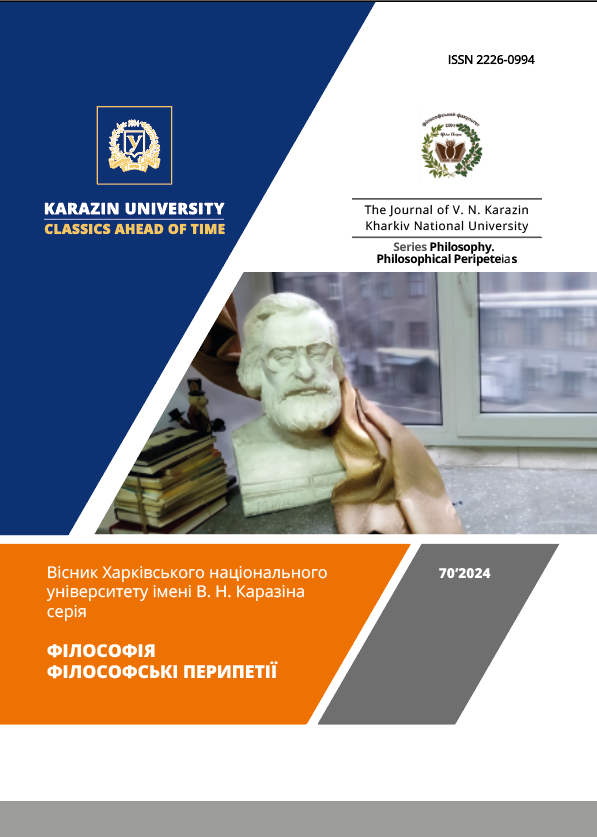REFUGEES: FRAMING VULNERABILITY AND THE STRUGGLE FOR RECOGNITION
Abstract
The article is devoted to the study of the refugee, who is interpreted as a figure in a state of precarity. The article is divided into three interconnected blocks. The first block examines the development of the refugee problem in Ukrainian social sciences. We suggest that in the sciences, refugees are identified with the problem that needs to be solved, thus losing their own subjectivity. Whether it is the need for help, the discourse of the "alien" or potential economic utility - these nominations saturate the concept of "refugee", depriving the refugees themselves of self-sufficiency in the field of scientific conceptualization. In the second block, we develop the figure of the refugee within the frame theory. A frame is a framework of interpretation, which, on the one hand, acts normalizing, as a normative judgment, and on the other hand, must constantly circulate in the discourse for the sake of its own legitimation, thereby breaking away from its own context and causing its own instability. We interpret the refugee as a precarious figure in two senses: on the one hand, they depend on whether society recognizes him (whether he will fit into the frame), on the other hand, they are framed as a precarious figure. At the same time, the refugee - who enables the self-destruction of the frame, thereby poses a threat to the social order of society. The third block is devoted to a brief description of the strategies that refugees can potentially take in the matter of integration into the frame/society. By strategies, we understand general vectors, the most abstract directions of movement, relationships that a refugee can take in the process of framing the very existence of a refugee in a state of precarity. It is this word that we propose to use, since each of these vectors can be implemented by various tactics and, accordingly, crystallize into a set of typical trajectories (or, as E. Goffman would say, a career). We highlight three general strategies, in which we briefly mention the specific tactics of their implementation: these are the strategies of integration, building oppositions, and balancing on the border.
Downloads
References
Balakireva, O. (2016). Forced migrants and host communities: lessons for effective social adaptation and integration: scientific report. Kyiv: Institute of Economics and Forecasting of the National Academy of Sciences of Ukraine. (in Ukrainian).
Bataeva, E., Popova, O. (2018). Sociocultural Capital of Reluctant Migrants: Theory and Problem of Measuring. The Journal of V. N. Karazin Kharkiv National University, series "Sociological research of modern society: methodology, theory, methods." 2018, 39, 41-52. (In Ukrainian).
Butler, J. (2009). Frames of war: when is life grievable? London: Verso.
Butler, J. (2004). Precarious life: the power of mourning and violence. London: Verso.
Bauman, Z. (2000). Liquid Modernity. Wilmington: Polity Press.
Keenan, B. (2023) Mimetic Desire & the Scapegoat: Notes on the Thought of René Girard. Critical Legal Thinking: Law and the Political. Retrieved from: : https://criticallegalthinking.com/2023/09/04/mimetic-desire-the-scapegoat-notes-on-the-thought-of-rene-girard/
Last year, Ukrainians opened every tenth new business in Poland, a total of more than 30,000 sole traderships. (2024). Forbes. Retrieved from: https://forbes.ua/news/ukraintsi-torik-vidkrili-kozhen-desyatiy-noviy-biznes-u-polshchi-zagalom-ponad-30-000-kompaniy-01052024-20930 (In Ukrainian).
Libanova, Е. (2014). Forced resettlement from Donbas: scope and challenges for Ukraine. Journal of the National Academy of Sciences of Ukraine. Kyiv, 2014, 12, 15-24. (in Ukrainian).
Maidanik, I. P. (2018). Migrants in large cities of Ukraine: composition and socio-economic involvement. Ukrainian Society. 2018, 4. (in Ukrainian).
Novikova, O.F., Amosha, O.I., Antoniuk, V.P. and others. (2016). Internally Displaced Persons: From Overcoming Obstacles to Strategies for Success. NAS of Ukraine, Institute of Industrial Economics. Kyiv. (in Ukrainian).
Panasiuk, L. V (2021). Ideology of "Russian world" and bilingualism. Politicus. 2021, 3, 110-116. (In Ukrainian).
Pankova, O. V., Kasperovych, O. Y. (2018). Directions and mechanisms of participation of civil society institutions in creating a protected space for internally displaced persons in Ukraine. Ukrainian society. 2018, 4, (67). (In Ukrainian).
Popova, O. (2020). Factors of inefficiency of social communication of forced migrants in the host society. The Journal of V. N. Karazin Kharkiv National University, series "Sociological research of modern society: methodology, theory, methods." 2020, 44, 43-49. (In Ukrainian).
Ranciere, J. (2004). Disagreement Politics and Philosophy. Minnesota: University of Minnesota Press.
Rey Chow. (2014). Not Like a Native Speaker On Languaging as a Postcolonial Experience. New-York: Columbia University Press.
Soroka, Y. G. (2017). Hostility towards internally displaced persons: a research "contribution" to the formation. The Journal of V. N. Karazin Kharkiv National University, series "Sociological research of modern society: methodology, theory, methods." 2017, 37, 125-128. (In Ukrainian).
Copyright (c) 2024 Володимир Панов, Вадим Сахно

This work is licensed under a Creative Commons Attribution 4.0 International License.
Authors who publish with this journal agree to the following terms:
- Authors retain copyright and grant the journal right of first publication of this work under the terms of a license Creative Commons Attribution License 4.0 International (CC BY 4.0).
- Authors are able to enter into separate, additional contractual arrangements for the non-exclusive distribution of the journal's published version of the work (e.g., post it to an institutional repository or publish it in a book), with an acknowledgement of its initial publication in this journal.
- Authors are permitted and encouraged to post their work online (e.g., in institutional repositories or on their website) prior to and during the submission process, as it can lead to productive exchanges, as well as earlier and greater citation of published work.






3.gif)




